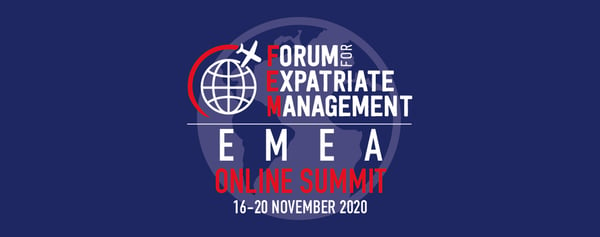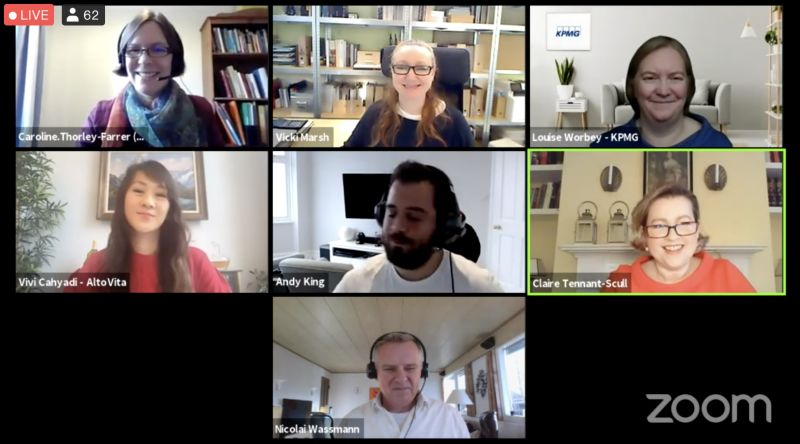
As we continue to grapple with the consequences of the Covid pandemic, what are the key fundamentals of a sound mobility program?
Compliance, cost containment, talent management, policy design are all vital elements.
Our CEO and Co-Founder, Vivi Cahyadi Himmel recently joined the FEM online summit, which was proudly sponsored by AltoVita on Friday 20th November to discuss where we are now and what we can do differently moving forwards in order to gain from lessons learned prior to the lockdown.
Vivi was also joined by Andy King of Global Mobility Manager – Improbable, Caroline Thorley-Farrer of Group Director of Global Mobility – Worley, Louise Worbey of Global Mobility Lead – KPMG, Nicolai Wassmann of Senior Specialist – Novo Nordisk and Vicki Marsh of SVP Solutions Consulting – Equus Software.
TAKEAWAY 1: WHAT ARE THE TRENDING SECTORS AND LOCATIONS IN GLOBAL MOBILITY RIGHT NOW?
During the panel discussion, Claire highlighted how assignees posted abroad during or before the pandemic, ended up working remotely but have managed their assignments and in turn companies themselves are controlling cost containment, at scale.
Vivi followed up with this topic and mentioned that, from a corporate housing perspective, we are still seeing a lot of of tax driven moves in terms of relocation in many of locations, including Brexit winners such as Luxembourg, Paris or Frankfurt across both financial firms and retail giants to technology providers and pharmaceuticals companies.
In terms of further development, Vivi said that it is ultimately about the readiness and suitability of supply, particularly in many difficult locations such as west Africa, latin America and the middle east even, where safety, security, and basic requirements are still a big essential issue in terms of duty of care.
Whilst there are many genuine talent requirements in these markets, the corporate housing supply is still lacking, because it’s not straight forward from real estate investment and operational execution perspectives.
These are the current challenges for global mobility and that’s why as a company AltoVita wants to become an advocate for investors and operators alike, so they can best deploy their resources and focus on global mobility initiatives for their employees around the world.
Louise agreed with this and mentioned that whilst technology is available to asset with these initiatives, visibility remains imperative as global mobility and employee operations need to be personally managed whilst optimised at the same time.
That’s why from a remote working perspective, we all need to be hands on with duty of care in order to understand employees needs during these difficult times, even when we can’t plan ahead.
The panel concluded this topic by agreeing that as a service, providing different alternative accommodations across various locations, tailored to bespoke demand needs, whilst managing technical challenges such as data control, are important key factors our industry must resolve across all markets if we are to really learn from the past few months.
TAKEAWAY 2: BOTH COVID-19 AND BREXIT PROVIDE OPPORTUNITY FOR THE GLOBAL MOBILITY SECTOR….
Rather than focusing on the negatives surrounding such events in 2020 as the pandemic or Brexit, Louise rightly highlighted how these experiences provide industry leaders with the unique opportunity to step up and to assist businesses to better manage and optimise their talent pipeline.
By pulling together with multidisciplinary experts from around the world, we can learn the lessons from one event to the other and recommend the best solution, based on location and accommodation requirements to costs and restricted budgets.
Virtual assignments, where also highlighted across the session as a fantastic example at how employees can utilise their skills and in turn potentially helps make global mobility a more inclusive area by connecting companies with a broader range of options.
TAKEAWAY 3: HAS GLOBAL MOBILITY RAISED ITS PROFILE WITH WIDER BUSINESS AS A RESULT OF THE EVENTS IN 2020?
75% of the audience agreed with the above statistic during the panel, showing that mobility should not just be thought of as a last resort, but rather addressed as an option that all businesses can optimise in a risk free way.
The stats also revealed, that perhaps based on local lockdowns within the global pandemic, businesses are much more flexible now in terms of their remote working capabilities and thus are willing to learn and adapt new practices.
This situation has let us, as an industry continue working with more businesses in order to facilitate the options that are available. Vicki also noted the irony that as an industry, we have never been so busy despite people not being able to move with local restrictions!
A key fact to consider is also understanding how global mobility can leverage this momentum and resolve the strain on its resources moving forwards.
In terms of the acceptance of technology within global mobility, Vivi concluded by commenting on how, whilst assignees are really well accustomed to these tools and online features, there is still a lot we can learn to help improve this experience for them as industry leaders and how we can best balance a human centric approach with this as well.
Ultimately, by fine tuning the balance between technology and people, the group agreed that together, we can create an effective eco-system for all employees and companies whilst preparing for the next evolution from compliance to duty of care daily changes.



